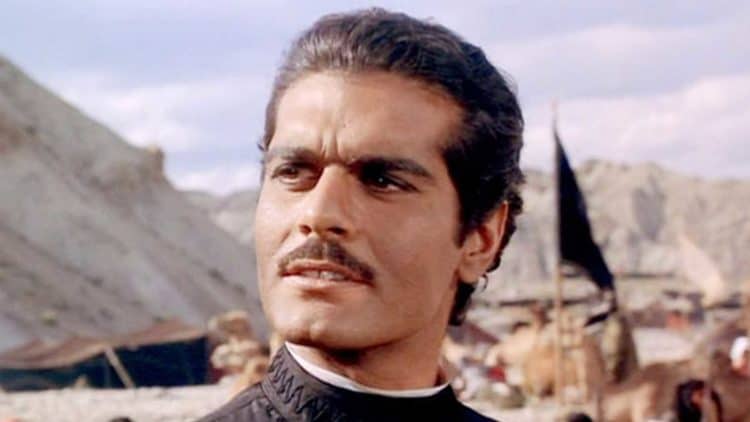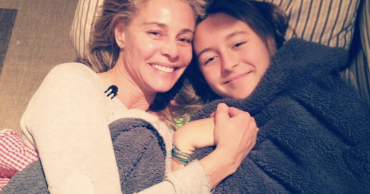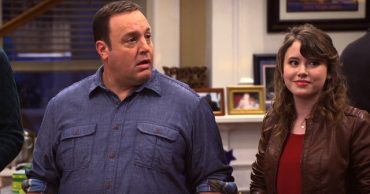
Omar Sharif is a famous Egyptian actor who was born in Alexandria, Kingdom of Egypt, on April 10, 1932. This week would have been his 86th birthday had he not died from a heart attack on July 10, 2015. Sharif began his career as an actor during the 1950s and is probably best known for Sherif Ali in ‘Lawrence of Arabia’ and Yuri Zhivago in ‘Doctor Zhivago’. Other films in which he appeared included ‘Funny Girl’, ‘War in the Land of Egypt’, ‘Mysterious Island’, ‘S*H*E’, and ‘Bloodline’. This talented actor won three Golden Globes and a Cesar Award during his career. Here are five more things you did not know about Omar Sharif.
1. His Birth Name Was Michel Dimitri Chalhoub
Although he is well-known by the name Omar Sharif, this is not the name with which he was born. He was actually called Michel Dimitri Chalhoub. Unlike many actors who change their name for professional purposes, Omar Sharif’s reasons were more personal. He took on the new name and changed his religion Christian to Islam in order to marry.
2. He Could Speak Five Languages
Even as a child, Omar Sharif showed a talent for languages. As an adult, he traveled the world throughout his career. Although he was born in Egypt, he lived in London as a student, often worked in America, traveled Europe extensively, and later lived in Paris. As a result, he was fluent in five languages; Arabic, English, Italian, Spanish, and French.
3. He Was Married to Faten Hamama
Sharif met actress Faten Hamama on the set ‘Struggle in the Valley’, a film in which they both starred in 1954. The couple fell in love and married the following year. She had previously been married to Ezzel Dine Zulficar from 1947 to 1954 and together, they had a daughter, Nadia Zulficar. They went on to have a son together, Tarek Sharif, who was born in 1957. Unfortunately, the marriage did not last and the couple separated in 1966. However, their divorce was not finalized until 1974. Sharif claims he never fell in love again and that was why he did not remarry. Hamama married her third husband Mohamed Abdel Wahab Mahmoud in 1975 and they remained married until her death in 2015.
4. He Was a Successful Contract Bridge Player
One of Sharif’s personal passions was playing bridge. In addition to his acting career, he was also extremely successful as a contract bridge player. He was once ranked in the top 50 contract bridge players in the world. He represented the United Arab Republic in the 1964 World Bridge Olympics and was the playing captain of the Egyptian team in the 1968 Olympiad. He founded the Omar Sharif Bridge Circus in 1967 as he wanted to showcase bridge to the rest of the world.
5. He Supported Hull City Football Club
Outside of work, Omar Sharif had many passions and one of these was football. He was an avid supporter of Hull City Football Club. When he lived in Paris during the 1970s, he would ring the football club’s automated match line to find out the results of a game. Sharif was also a huge fan of horseracing.
6. He wasn’t always box- office gold
Despite his many career successes, Sharif wasn’t immune to the odd flop or two. His first box office failure came with 1969’s western, Mackenna’s Gold, in which he reunited with Beyond a Pale Horse co-star, Gregory Peck. 1969 saw another fail when he starred alongside lead actress, Anouk Aimee, in the Sidney Lumet feature film, The Appointment. 2 years later, he flopped again (this time with Michael Caine for company) in James Clavell’s The Last Valley. 1971’s French crime caper, The Burglar, gained huge audiences across France, but met with a lukewarm response across English speaking countries. Sharif later remarked that it was the offer of films by directors that he couldn’t turn down, but which turned into box office failures, that nearly killed off his acting career.
7. He quit gambling in 2000
After enjoying bridge for many decades, Sharif laid down his cards for the final time in 2000. What he’d once considered a passion had turned into an addition- one that Sharif had no intention of being a slave to. Despite his refusal to indulge in any gambling himself, Sharif did, however, continue to reap the rewards of the game, both by licensing his name to bridge software games, and co-authoring “Omar Sharif Talks Bridge”, a chronicle of some his biggest deals and tales about the game.
8. He temporarily retired from Hollywood
For much of the 1990’s, Sharif was reduced to minor bit parts and walk- on appearances. His first big role in years came at the end of the decade, with the 1999 historical action film, The 13th Warrior. The film was financially disastrous, losing almost $129 million at the box office and making the record books as one of the biggest box office failures in history. Sharif was so embarrassed at the film’s failure that he temporarily retired from film-making, and didn’t hit our screens again until 2003’s Monsieur Ibrahim.
9. He took a firm position on the Egyptian revolution
The Egyptian revolution of 2011 saw youth groups across the country staging widespread demonstrations against the increasing hold of police brutality during Mubarak’s presidency. The clashes between demonstrators and security forces resulted in over 800 deaths. A further 6000 were injured. Sharif made his feelings on the revolution clear, calling for the resignation of the country’s president with the statement: “Given that the entire Egyptian people don’t want him and he’s been in power for 30 years, that’s enough”.
10. He had a heart bypass
After years of puffing away on over 100 cigarettes a day, Sharif suffered a heart attack in 1994. Although the attack was relatively mild, the years of smoking had done their damage, and a triple heart bypass was ordered. After the bypass, Sharif never picked up another cigarette again.
11. His final years were marked by ill health
Although Sharif’s 1994 heart bypass was a success, by 2015, his health had become an increasing concern to those around him. Whispers of Alzheimer’s disease circulated when Sharif’s son, Tarek, mentioned his father was becoming increasingly confused and forgetful, and would often struggle to remember the names of some his best-known films. In July 2015, Sharif’s health took a turn for the worse. His death on 15th July from a heart attack came less than 6 months after the demise of his first wife, Faten Hamama.
12. He was court ordered to attend anger management classes
In 2005, the hot- headed Sharif was forced to take anger management classes by a US court in Beverly Hills. The court order came after Sharif was found guilty of assaulting a parking attendant for refusing to accept his European currency. The actor pleaded no contest to the misdemeanor, despite not being present at the hearing itself. Along with the classes, Sharif was placed on a 2-year probation, and ordered to keep at least 100 yards from the victim, witnesses and restaurant at which the incident occurred.
13. He was fined $1700 for headbutting a cop
Sharif’s 2005 court case wasn’t the first time he’d had trouble with the law. In 2003, Sharif received a one month suspended prison sentence after attacking a police officer in a Parisian casino. The police officer incurred the wrath of the tempestuous Sharif after intervening in a dispute between the actor and a member of the casino’s staff. Sharif was fined $1700, while the officer was awarded $340 in damages for his troubles.
14. He was friends with Hollywood Royalty
As you’d expect from an actor that starred alongside some of the greatest movie legends of the 20th century, Sharif had some very famous friends. His friendship with acting legend, Peter O’Toole, is a prime example. The pair first starred together on the set of 1962’s Lawrence of Arabia. During the filming of the movie, O’Toole gave Sharif the affectionate moniker of “Freddy”, after declaring “no one could possibly be called Omar Sharif”. The friendship endured for many years, and would see the pair team up again in the 2005 biblical epic, One Night with the King.
15. He served during the Suez Canal Crisis
In 1962, the world was buzzing with news of the combined invasion of Egypt by Israeli, French and UK troops. The aim of the (ultimately unsuccessful) mission was to regain western control of the Suez Canal and depose Egyptian President, Gamal Abdel Nasser. Sharif did his due patriotic duty and joined the Egyptian militia. However, he was a reluctant recruit, and considered the idea of going up against the advanced weaponry of the enemy with his pea shooter rifle absurd. The conflict did at least create some lasting memories for Sharif, which he shared during an interview with British television host, Michael Parkinson. Coincidently, Parkinson had also served during the crisis (albeit for the opposite side) and the two spent the interview comparing their recollection of events.
16. His introduction to America got off to a rocky start
Sharif’s first visit to the USA was for the premiere of Lawrence in Arabia. His trip got off to a shaky start when co- star, Peter O’Toole, dragged him along to a Lenny Bruce show the night before the big opening. After the performance ended, Bruce (a notorious drug addict), O’Toole and Sharif shared a few drinks before retiring to Bruce’s apartment. A short time after they arrived, the party was broken up by the arrival of the police. When Bruce was found shooting up in the bathroom, the police put the whole gang under arrest and marched them off to the local police station. Fortunately, Sharif had the presence of mind to call producer, Sam Spiegel, who’s army of six lawyers managed to get the three released on bail just in time for the big premiere.
17. He nearly lost out on his big break
Sharif’s big break in Lawrence of Arabia almost didn’t happen at all. His breakthrough role as Sherif Ali was originally offered to Bollywood star, Dilip Kumar. Sharif was intended for the lesser role of Tafas, a minor character who gets shot by Sherif Ali in the movie’s opening sequence. Fortunately for Sharif, Kumar turned down the role, and Sharif’s subsequent promotion to the role of Sherif Ali would lead to one of the finest performances in film history.
18. He won a Sergei Eisenstein Medal
During his long and illustrious career, Sharif was the proud recipient of multiple award and nomination nods. His first success came with his performance as Sherif Ali in Lawrence of Arabia, a role that won him a Best Supporting Actor nomination at the 35th Academy Awards. Sharif ultimately lost out on the award to fellow actor Edward Begley, who claimed top price for his extraordinary performance in the 1962 classic, Sweet Bird of Youth. Sharif didn’t stay defeated for long, however, and went on to claim two Golden Globes that year for the same role. In 1968, he continued his run of award success with a third Golden Globe for his role as the titular character in Doctor Zhivago. 2005 saw perhaps his biggest and proudest moment, when he picked up an extremely rare (and extremely coveted) Sergei Eisenstein Medal from UNESCO. The medal (one of only 25 to ever be awarded) was delivered in recognition of Sharif’s significant contribution to world cinematography and diversity.
19. He had an affair with Barbara Streisand
During the 1967 filming of the musical classic, Funny Girl, Sharif enjoyed a short-lived fling with his leading lady, Barbara Streisand. Given that both Streisand and Sharif were married at the time, their romance stirred up quite the controversy. Despite the pair’s mutual infatuation, their love was not too last, and after an intense four months, the final curtain was drawn on both the affair, and, coincidentally enough, the filming of the movie.
20. He caused international controversy
Despite being short-lived, Sharif’s relationship with Streisand managed to stir up some serious international controversy. Their affair hit the headlines just as the world was dealing with the fallout of the Israeli-Egyptian Six Day War. The romantic union of a Jew and an Egyptian incensed both sides, and the Egyptian government went so far as to issue a public ban on the film and threaten to withdraw Sharif’s Egyptian citizenship. The situation was made especially uncomfortable for Sharif by the fact that all the investors in Funny Girl were, like Streisand herself, both Jewish and heavily pro-Israel. However, the pair weathered the storm and continued their relationship until the very final days of shooting.
21. He wasn’t a fan of fried egg sandwiches
Never one to rest on his laurels, Sharif didn’t stay heartbroken for long after the end of his entanglement with Streisand. The next leading lady to fall for his dashing good lucks was French actress, Catherine Deneuve, his co-star in the 1968 movie, Mayerling. Next on the list was German- American actress, Barbara Bouchet, who caught Sharif’s roving eye when she appeared near naked on the cover of Playboy. Sharif’s reputation as a lady’s man was clearly well founded, but there was one young, attractive co-star that completely failed to ignite his passions. Julie Christie, his co-star on 1965’s Dr Zhivago, dampened the desire of her leading man by her apparently off-putting habit of eating fried egg sandwiches on set.
22. He may have had more children than we realized
Sharif had a son, Tarek, with former wife, Faten Hamama. However, it’s thought that Sharif may have had more children than he publicly acknowledged. Before his death, an Italian journalist claimed that Sharif had fathered her child after a brief dalliance in the late ‘60’s. Sharif dismissed the suggestion and claimed that theirs had been a “very brief affair” and that he didn’t consider the child his son. He did manage to contradict himself somewhat when he went on to say, “It is possible that I might have 100,000 sons”, as in those days, he “never bothered with contraception”.
23. He and Peter O’Toole shared champagne baths
In 1976, Sharif released his memoirs, L’Éternel Masculin, in France. A year later, the English version, The Eternal Male, was released in America. Chronicling the actor’s wild exploits in the ‘60’s, the autobiography is particularly interesting for its description of the high jinks he and Peter O’ Toole got up to on the set of Lawrence in Arabia. Sharif described how the pair would have champagne baths, and once managed to squander nine months’ salary during a single gambling session. “We’d drink without stopping for 48 hours . . . we went hunting girls in every bar, every nightclub”, he recalled.
24. His parents had friends in high places
Sharif was raised in a wealthy district of Cairo, where his mother, one of the most glamorous “It” girls of her day, would regularly play host to such distinguished company as King Farouk, the deposed Egyptian monarch. “My mother used to play cards with King Farouk,” Sharif recalled in his autobiography. “He believed she was good luck to him – she was his mascot”.
25. His love of acting inspired some dramatic acts
When Sharif was ten, he was sent to a strict, British-style boarding school in Cairo. It was there that Sharif fell in love with acting- much to the horror of his deeply conventional father, who had planned for Sharif to join him in the family trade. After his father banned him from taking acting further, Sharif was so distraught that he slit his wrists. Although a dramatic gesture, Sharif later admitted that it wasn’t a serious suicide attempt.
 Follow Us
Follow Us




